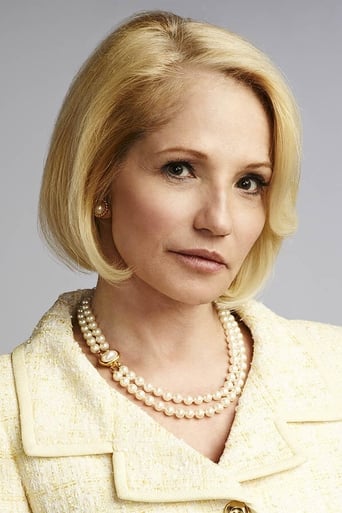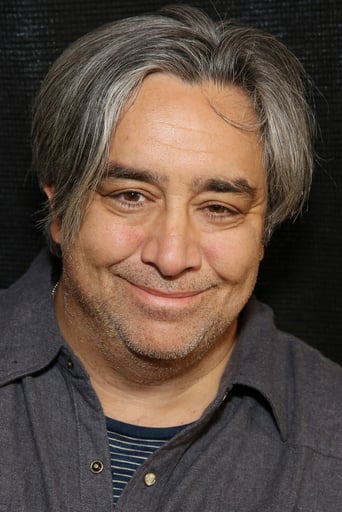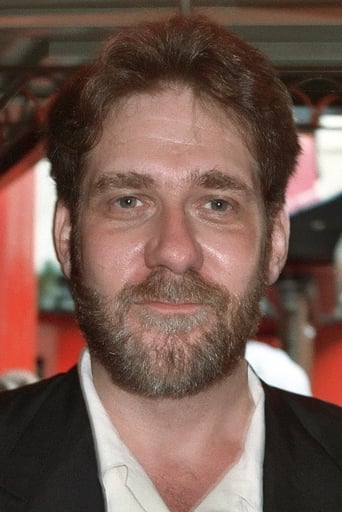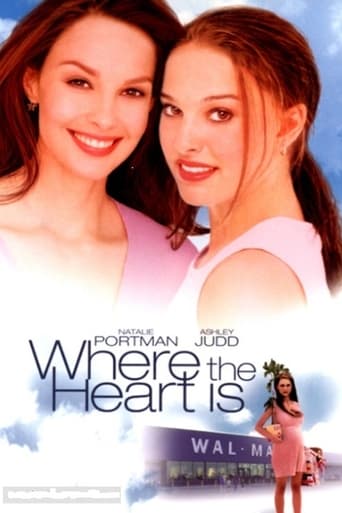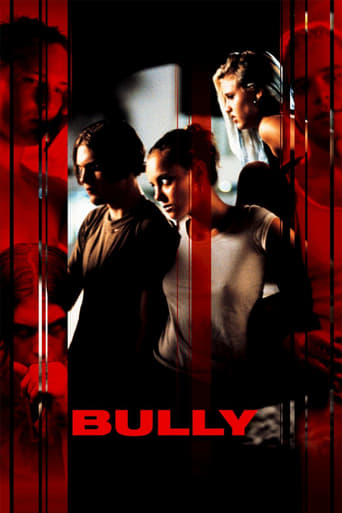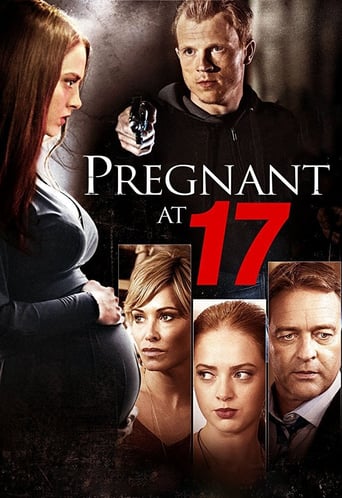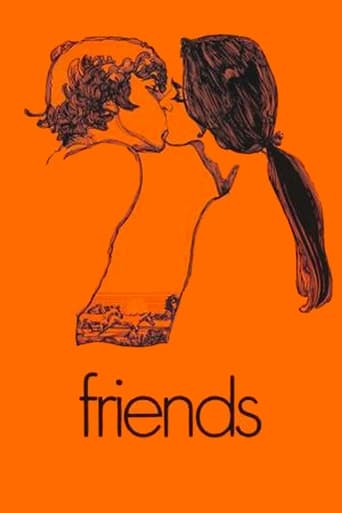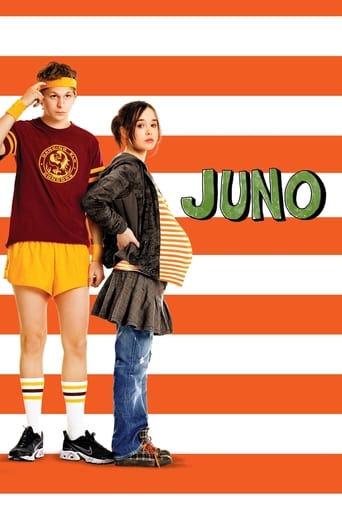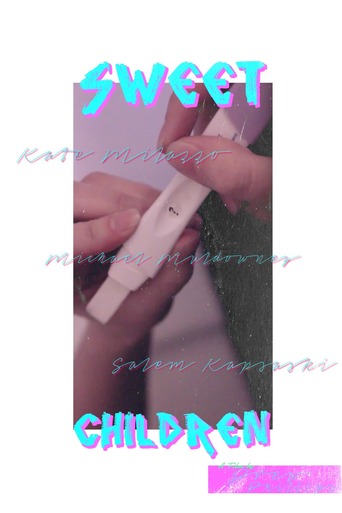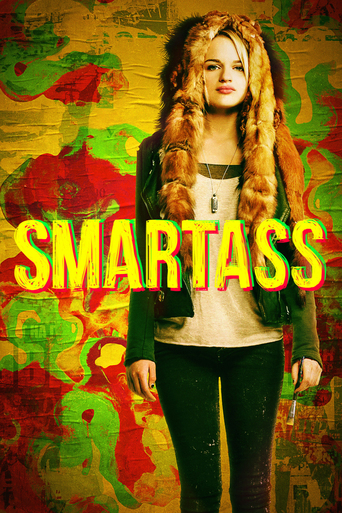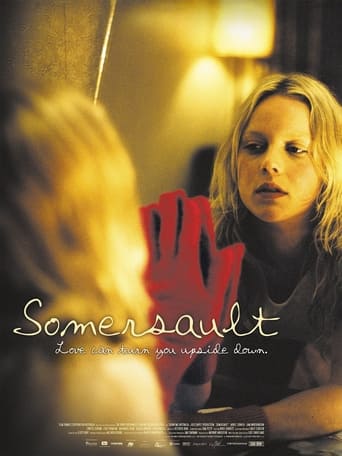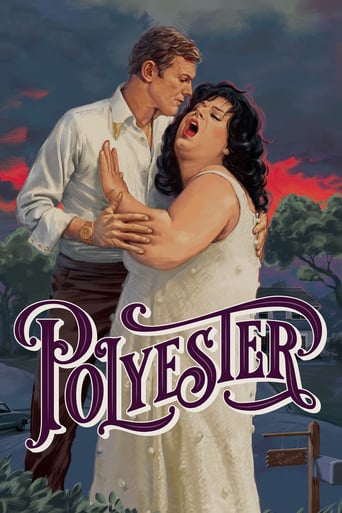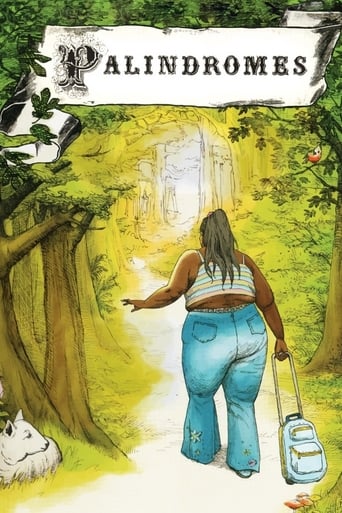
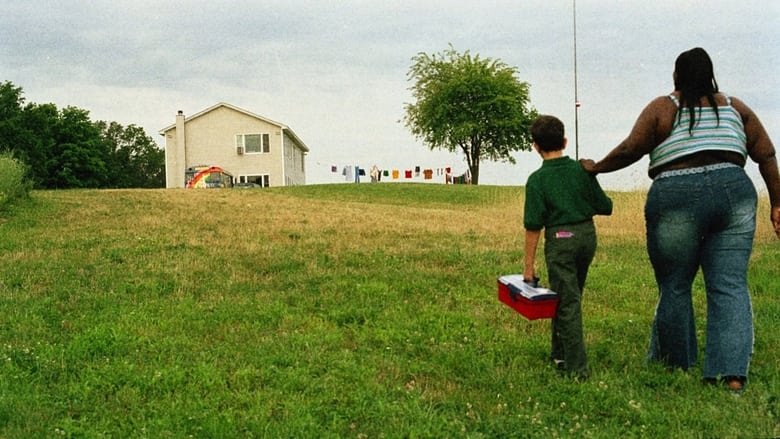
Palindromes (2005)
Aviva is thirteen, awkward and sensitive. Her mother Joyce is warm and loving, as is her father, Steve, a regular guy who does have a fierce temper from time to time. The film revolves around her family, friends and neighbors.
Watch Trailer
Cast


Similar titles
Reviews
Like Woody Allen, Todd Solondz spends his time poking fun at man's foibles, whilst perhaps simultaneously wishing he weren't part of the very social fabric he condemns. It's your classic ego trap: "I'm better and above you, but worthless and wish I were with you." Solondz made "Fear, Anxiety and Depression" in 1989. He wrote and directed that film and, like Woody Allen, also cast himself as the film's neurotic hero. Like Allen's alter ego in "Annie Hall", the geeky looking Solondz spent the entire film bumbling about, venting his various dissaffections.Solondz was never happy with "Fear", however, and promptly disowned the film when his producers re-edited it behind his back. Burnt by the film industry, Solondz slipped into depression. He withdrew into isolation and became a teacher and writer. During these years his approach to art changed drastically. His screenplays became more formal, more precise, more caustic, and his visual style became cold. Ice cold.Solondz's first film when he emerged from his depression was "Welcome to the Dollhouse". Drawing upon his own unhappy school years, "Dollhouse" is about Dawn Weiner, a girl whom the universe seems to have condemned. More sinister than similar teen movies, "Dollhouse's" Dawn is so insecure she's happy to let a kid at school rape her if it means validating her own self worth. This would be rapist is himself marginalized, insecure and so reliant on sexual threats for self validation. Dawn is so filled with rage she even saws off the heads of her sister's dolls, fantasises about bashing people with a hammer and deliberately causes her sibling to be kidnapped by a local paedophile. Meanwhile, all the abuses people hurl at the geeky Dawn, Dawn hurls down at her little sister, a girl whom she unfairly despises. The result is that Dawn is shown to be capable of the same kind of brutality that she's subjected to. Social bullying is internalised, becomes self-hatred, and is then redirected violently back out at others."Dollhouse" was a cosy film compared to Solondz's next three flicks. In "Happiness" he portrays a web of characters, all of whom harbour different problems and neuroses, and all of whom are linked by their desire for absolute contentment. And so we have a paedophile who is only happy around kids, a successful writer who is only happy if she writes something of substance, a musician (who ironically writes songs of substance) who can't find success and is so discontent, an elderly couple who no longer have the will to live, a fat man who fantasises about raping women, a fat woman who is disgusted by sex and a dopey housewife who is blissfully unaware of the disturbing truths that exist beneath her sweet suburban facade. Forget "American Beauty" and "Blue Velvet". Solondz ends his film with a Norman Rockwell kid ejaculating on his front balcony. Solondz's point is almost classically psychoanalytic: Lack breeds Desire breeds Suffering. Peel away the emotional baggage and happiness is a stain that oft amounts to nothing more than a fleeting moment of biological bliss."Happiness" doesn't broadening its horizons to tackle the wider social and structural issues that better directors align to their existential musings, but it does offer more than Sam Mendes' "American Beauty". Indeed, Solondz's next film, "Storytelling", seemed designed to address those critics who pointed out the similarities between "Happiness" and "American Beauty". Mendes has himself slammed Solondz on numerous occasions, and so perhaps "Storytelling" is best viewed as a sort of intellectual assault on Solondz's critics."Storytelling" is divided into two segments, the first called "fiction" the second called "non-fiction". "Fiction" is about a creative writing student who has "sympathy sex" with a mentally disabled kid and later lets her African American teacher "rape" her. She then turns her experiences into a work of fiction which purports to be "truthfully" based on these factual encounters."Storytelling's" second segment then focuses on a documentary director who makes a documentary called "American Scooby" (a parody of "American Beauty") in which he follows a high school student around campus. The documentary director hopes to uncover the "truth" of growing up in suburbia, but in reality is merely transposing his own "deep thoughts", self-analysis and existential hang-ups onto a modern teen who is actually a dopey airhead. The end result is that film-maker and child enter a sort of exploitative relationship. The kid gets fame and is portrayed as being "deeper" than he is, while the film-maker gets prestige for nothing. End result: Solondz essentially advocates the sort of "truthful" sensationalism present in the non-fiction segment of the film, whilst aligning human delusions (love, romantic illusions, family etc) with the fictions of the second half. Other themes abound - the power games and domination/exploitatin reversals of "Dollhouse" are reworked here with subplots about a vengeful maid and a black teacher - but it's the "American Beauty" angle that's most interesting."Palindromes" is thus far the weakest of Solondz's films. The first and last words in the movie are "Mom", a pair of palindromes through which Solondz implies that "nothing ever changes". Indeed, Solondz makes the film a palindrome at every level, his Schopenhaueran point being that we are paradoxically always changing and never changing (hence different actors play the same character), every desire and addiction merely supplanting another. It's an extremely bleak film, depending how much trust the audience puts in its final monologue. This bleakness has led to critics labelling Solondz a misanthrope, but he's no more colder than both Allen and the Coens, two other contemporary critical darlings who've spent their careers reworking similar material.7.9/10 – "Welcome to the Dollhouse", "Palindromes" 8/10 – "Storytelling", "Happiness"
First and foremost, do not watch this movie, it's terrible.With that said, there are actually a few positives and I cannot say Todd Solondz is a completely worthless filmmaker. His films are always interesting. So, here's why Palindromes gets 1 star as opposed to 0: 1. An interesting and thought-provoking examination of abortion. I like the way Solondz examines this issue from several different perspectives and leaves us with no simple answer.2. Some funny moments. I laughed about 2 or 3 times.3. Bold. This is the best thing this film has to offer. But, when a movie is boring and the story is stupid and the character development is weak, then boldness is basically worthless.So, to go into a little more detail as to why this movie sucked: There are three qualities that must be present in a movie in order for me to find it good. They are, entertainment value, an engaging story and characters that I feel emotionally attached to. Palindromes fails on every level. The two or three times that I laughed in this film are not enough for me to call it entertaining. This movie was extremely boring, I was just waiting for it to end (although I do understand that this is just an opinion.) I felt no emotional attachment to any character in this film. I own Happiness and found it to be a phenomenal and very entertaining film with interesting characters that I felt attached to. But the character development in Palindromes just didn't draw me in. I understand what Solondz was trying to demonstrate with Aviva being played by several different actresses. I assume he's trying to demonstrate how the issue of abortion affects several different types of people regardless of their race, age, gender (one of them was a boy) or size. I also assume that each actress or actor playing Aviva is a symbolic representation of Aviva's self image at the time. Plus, it reinforces the Palindromes concept that no matter how much you seemingly change you will always come back to your true self. But, after a while this tactic took away from me becoming emotionally attached to Aviva. It was just distracting. This is the type of intellectual approach that sounds good on paper but takes away from the viewer becoming emotionally involved. And finally, story. There was nothing engaging to me in this story except for maybe a thought provoking examination of abortion. Not good enough. With the distracting actress-changing, the lack of character development and the boring tone, I gave up on this stupid story pretty early on anyway.So, I haven't even started on how vile, deplorable and sickening this movie was. I'm just wondering how Todd Solondz convinced so many underage actresses and their parents to allow him to place them in so many sexually perverse scenes. I'm not saying this is child pornography because it isn't. But, between a child sex-scene pretty early on, scenes of pedophilia and child anal rape and a final child sex scene that is just shocking, it's pretty damn close. I completely support freedom of speech, thought, religion etc... and I am in no way disputing Todd Solondz's right to express himself. What I really want to address is the soul of our cinema and what we as free individuals allow into our lives. If we allow this sort of disgraceful material into our lives then we are allowing sick thoughts into our minds. I don't even want to think about what sort of sick thoughts are inside the mind of the individual that came up with this film and directed these scenes. And now I am exercising my freedom to say, I think whoever came up with this movie must be disturbed in their own mind. I actually kind of pity a person that is this disturbed. And the rest of you that think this movie is "Amazing" and "Fascinating" and "Beautiful" should take a second to think about what sort of sick thoughts are swirling around your own head.Here is a list of 10 extremely disturbing films that are actually watchable. Some of these films examine the horror of pedophilia in an interesting and non-exploitative manner. All of these films have characters and story lines that you actually care about and they all deal with very heavy subject matter while remaining intelligent, entertaining and objective. L.I.E. The Woodsman Gummo Irréversible Leaving Las Vegas Bad LieutenantA Clockwork Orange Blue Velvet Funny Games Henry: Portrait of a Serial KillerThese ten films have something very crucial that Palindromes completely lacks... a soul.
There are hints of classical allegory (see: Darren Aronofsky's The Fountain) to this intriguing, disturbing, difficult but ultimately triumphant film. I think that the use of several characters to play Aviva (meaning "Springtime" in Hebrew) implies that the young lady is mildly schizophrenic - something that was either triggered by exposure to sex at such a young age, or by the trauma of the aberrant abortion.The film jumps around a bit in time. Chronologically, it starts with the first sexual encounter when Aviva visits the younger Otto (palindrome), and ends with Bob (palindrome) getting shot by the police. The film itself splices a few scenes in between, beginning and ending with the young black girl 'character' who is perhaps the youngest and most innocent of the Aviva characters. I was blown away by the portrayal of the foster family. Had no idea where to place them. I think that ultimately Solondz is sympathetic to them, which gives the film an impressively mature and equivocal view of religious fundamentalists (but a deep, dark part of me had a good chuckle, too).More please, Mr Solondz!
I am beginning to wonder at this point if Todd Solondz is himself a pedophile. But don't get me wrong; if he is then he at least understands whats wrong with it and at the same time he understands people, both victims and perpetrators. I'm willing to give him the benefit of the doubt and say that he is in fact not a pedophile and this is somewhat supported by the Mark Weiner character who for all intents and purposes may as well be Todd Solondz himself. Mark Weiner in a moment of what I believe to be total honesty declares to the Aviva character that he is in fact not a pedophile. It would have been safe enough for him to admit to her that he is a pedophile if he is. You'll have to watch the film to understand why. I was totally blown away by the film and actually watched it twice in a row because I needed to understand it more thoroughly. I highly recommend it for anyone who is a Todd Solondz fan and also for David Lynch fans as well. I'm not sure what to make of his portrayal of the Christian family, the Sunshines. I think it shows both the good and bad of the Christian right in America. I actually did spend sometime being good friends with a very similar family and eventually had to cut my ties with them after their illusion of Christian family bliss was shattered by the wife/mother's sexual advances toward me. An additional group of people I would recommend this film to is current or former right-wing Christians who are questioning their faith. This is where I come from and the movie definitely resonated with me because of that. I also appreciate Solondz' brave study of abortion. One could almost see it as a pro-life movie if it weren't for the fact that most pro-lifers would probably be horrified by it. I'm of the rare-breed that is a pro-lifer but not over-sensitive to controversial media. Still I would not say that this film proves Solondz' to be pro-life, rather it probably shows that to him the subject can never be completely black or white, which of course is a very wise and healthy viewpoint to have. Great job Todd Solondz!


